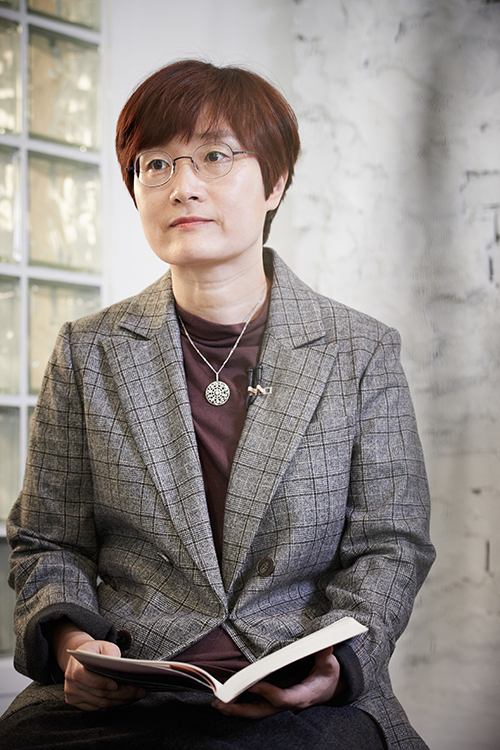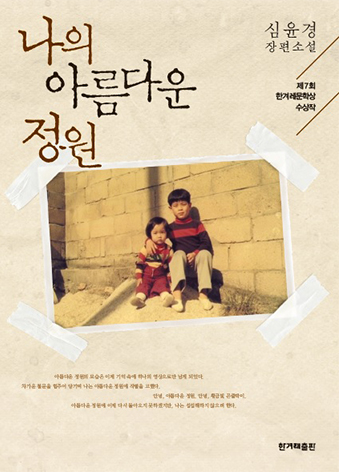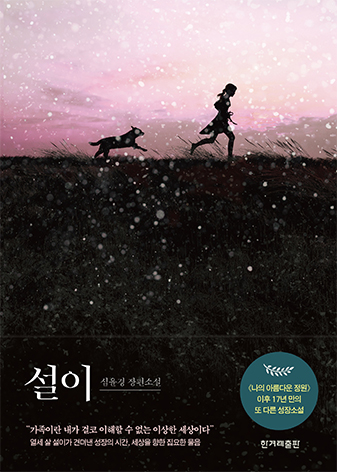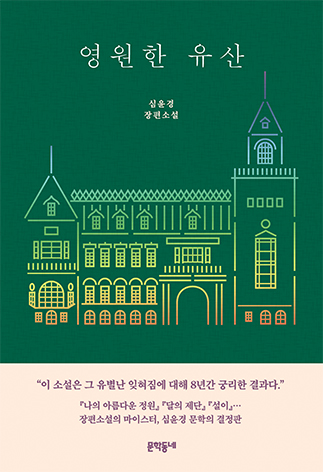|
Writer Sim Yun-Kyung A writer with a broad spectrum from full-length novels to children’s literature
2021.03.08
Writer Sim Yun-Kyung, referred to as the master writer of full-length novels in Korea, began writing fiction in 1998 and made her debut in 2002 with her My Beautiful Garden, winning the 7th Hankyoreh Prize for Literature. Since then, she has announced multiple full-length novels including The Moon’s Altar (Munhakdongne), Yi Hyeon’s Love Story (Munhakdongne), The Seorabeol People (Silcheon), and Seol-I, not to mention the children’s book The Series of Eun-ji & Ho-chan (Sakyejul) that has six volumes so far, astonishing her readers with her capability of writing stories across a number of fields from novels to children’s books. This is why her recently announced work Eternal Heritage is much anticipated.
Please introduce yourself to our subscribers.
Hello, everyone. I am novelist Sim Yun-Kyung. I published my first book in 2002, and until the newest title Eternal Heritage, which I have announced this year, I have written more than 10 fictions. It is quite difficult to introduce myself as a writer in a couple of sentences. It’s just that I feel lucky to have been able to write novels. I think I look into the most basic pains that anyone would have in their lives through the medium called novels and talk about them in my stories.
You won the 7th Hankyoreh Prize for Literature with My Beautiful Garden in 2002, and the 6th Muyeong Literary Award with The Moon’s Altar in 2005. How did you feel when you received those awards?
I was a lucky person in the early days of my career. I was lucky to a point where I even felt that everyone is as lucky as me, and it will last forever. But I believe that the awards and encouragements I got from the early days of my career helped me go through challenging times later on. If it were not for those glorious moments, I would have lost in the endless swirl of questioning myself whether I can even be called a novelist.
I think I look into the most basic pains that anyone would have in their lives
You were an office worker before you began writing stories. What kind of work did you do, and how did it help you in writing stories?
I had been working for a company for about 4 years. I worked at a publishing company as I had a mere idea that I wanted to write stories someday. As I didn’t think of the workplace as a place where I should build my career as a specialist, but as a place where I can stick together with good people and have a good time, I had fun working there. I didn’t feel so pushed. I feel quite embarrassed now. I thought that I would be able to write stories if I work with many writers, but then I realized that you cannot learn writing by watching over others’ shoulders but should have a firm resolution and do it yourself. This is why I quit the job. But I do think that my 4 years of work experience, a blend of financial issues, human relationships, and tough time commuting, has become a precious asset to me.
Is there any of your work that you would like to recommend to overseas readers?
My Beautiful Garden (Hanibook) is a novel that talks about an ordinary elementary school kid living in a mountain village near the Blue House, where he witnesses and experiences the turbulent moments in modern history. I chose the village where I was born and grew up as the background and tried to mirror the experiences and emotions of the people who lived there into the story.
By Beautiful Garden, Seol-I, Eternal Heritage
Is there a line that you felt most impressive? If so, why?
The most impressive line was “Grandma, shall we go to Noruneomi?” by Dong-gu, the protagonist in My Beautiful Garden. It was a blood-stained line that I let out as one with Dong-gu, condensing all the trials, challenges, and fear that I had as I was writing the first novel.
Among your many novels, which one is your favorite and why?
Well, apparently, my mind is mostly into the recent work Eternal Heritage. The great mansion “Byeoksusanjang” and the UN UNCURK were famous landmarks in the village that I grew up in. However, it faded away in people’s memory as it burned down in a fire in 1966. When historical facts and my personal experience faintly pass in my memory, power bursts in my body that I must put into letters. It was a long and challenging mission to describe what message the long-gone mansion wants to leave us, but it was indeed a rewarding experience.
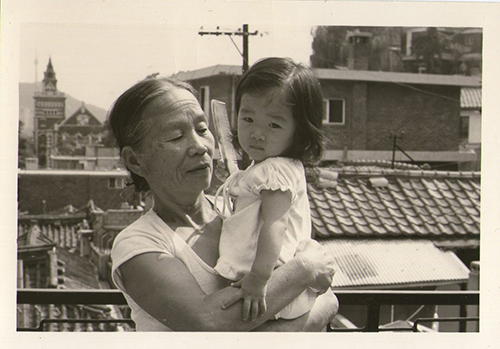
What made you write in the two different genres of novels and children’s books?
Perhaps it’s because there is still the voice from my childhood vividly heard in my mind that hasn’t been heard yet. In other words, I am a woman in my 40s, but deep inside my body, there is a part that did not age as much as my physical body that still stays in my childhood. In my novels, too, two of them have an elementary school kid as the main character. As my most painful ego still lives in that period, I sometimes have to let go of everything like literary techniques or imagination and just follow its voice.
Your novels have a diverse and rich worldview for each work. What is your method for writing novels?
Well... I don’t have specific method, but as a person who lives quite a calm and non-fluctuating life – I don’t even leave my little town that often, I might have a strong desire to race from one end to another in a totally different world in my novel like Son Goku. When I plot a story, I get to think about the parts that I haven’t touched yet.
I read and write stories to cure my torn heart.
What do you do after you finish a work?
I spend time of ultimate peace. Nowadays is such time. When I am writing a novel, my mind is filled with anxiety, nervousness, rush, and blame for my lack of ability. So when I am not writing one, I try to ease my body and mind as much as I can like a sloth. I walk around in my house and my village, enjoying the moments in daily life. Then, I would be ready once again to go through the challenge of writing my next title.
Lastly, is there anything you would like to say to our subscribers?
It’s been 20 years since I began writing stories, and during those years, I personally had to go through some key struggles in my life which were as painful as breaking a bone. As I went through each of them, writing novels helped me calm down my bleeding heart and find meaning in life and heal the wounded mind. If it were not for the novels, I am sure that my mind would have broken into pieces. I believe that reading and writing have such power. If the young me read and wrote stories for the interest and joy of myself, now, I do so to cure my torn heart. Struggles in life will come again unless you reach nirvana, but I am yet happy that with this mindset, I might be able to remain a writer for a longer time. I hope that the power of reading and writing is with you at all times, just like it is with me.
Organized by Lee Ji-Hyeon
|
Pre Megazine
-

Jakkajungsin Publishing Co.
VOL.69
2024.04 -

Writer Yun Jung-Eun
VOL.69
2024.04 -

Jumping Books Publishing House
VOL.68
2024.03 -

Writer Kim Hwa-Jin
VOL.68
2024.03 -

Publisher Hyohyung
VOL.67
2024.02 -

Writer Minha
VOL.67
2024.02 -

Almond Publishing
VOL.66
2024.01 -

Writer Kwon Jung-Min
VOL.66
2024.01 -

Hakgojae Publishers
VOL.65
2023.12 -

Writer Kim Hye-Jung
VOL.65
2023.12 -

Eidos Publishing House
VOL.64
2023.11 -

Writer Hwang In-Chan
VOL.64
2023.11 -

Munhakdongne
VOL.63
2023.10 -

Writer Chang Kang-myoung
VOL.63
2023.10 -

Happywell Publishing
VOL.62
2023.09 -

Writer Baik Soulinne
VOL.62
2023.09 -

Dasan Contents Group (Dasan Books)
VOL.61
2023.08 -

Writer Lim Kyoung-Sun
VOL.61
2023.08 -

SpringSunshine Publishing Co.
VOL.60
2023.07 -

Writer Lee Kyung-Hye
VOL.60
2023.07 -

Human Cube
VOL.59
2023.06 -

Doctor Jeong Jae-Seung
VOL.59
2023.06 -

Anonbooks
VOL.58
2023.05 -

Writer Son Bo-Mi
VOL.58
2023.05 -

Namhaebomnal
VOL.57
2023.04 -

Writer Kim Bo-Young
VOL.57
2023.04 -

Hugo Publishing
VOL.56
2023.03 -

Writer Cho Kwang-Hee
VOL.56
2023.03 -

Balgeunmirae Publishing Co.
VOL.55
2023.02 -

Writer Lee Byung-Ryul
VOL.55
2023.02 -

Wisdom House, Inc
VOL.54
2023.01 -

Writer Jeong Jia
VOL.54
2023.01 -

Humanitas
VOL.53
2022.12 -

Writer Kim Yeon-Su
VOL.53
2022.12 -

Songsongbooks
VOL.52
2022.11 -

Writer Eun Hee-Kyung
VOL.52
2022.11 -

Bombom Publishing Co.
VOL.51
2022.10 -

Writer Jiwon Yu
VOL.51
2022.10 -

Hangilsa Publishing Co., Ltd.
VOL.50
2022.09 -

Writer Kim Won-Young
VOL.50
2022.09 -

Moksu Publishing Company
VOL.49
2022.08 -

Writer Yoo Sun-Kyong
VOL.49
2022.08 -

Next Wave
VOL.48
2022.07 -

Writer Park Sang-Young
VOL.48
2022.07 -

A Thousand Hopes
VOL.47
2022.06 -

Writer Bora Chung
VOL.47
2022.06 -

Woongjin ThinkBig
VOL.46
2022.05 -

Dr. Oh Eun-Young
VOL.46
2022.05 -

JECHEOLSO Publishing House
VOL.45
2022.04 -

Writer Jang Ryu-Jin
VOL.45
2022.04 -

Changbi Publishers
VOL.44
2022.03 -

Writer Kim Ho-Yeon
VOL.44
2022.03 -

Mati Books
VOL.43
2022.02 -

Writer Lee Kkoch-Nim
VOL.43
2022.02 -

Picturebook Gongjackso
VOL.42
2022.01 -

Writer Kim Sang-Wook
VOL.42
2022.01 -

Writer So-yeon Park
VOL.42
2022.01 -

Writer Yoo Eun sil
VOL.42
2022.01 -

Kungree Press
VOL.41
2021.12 -

Writer Kim Lily
VOL.41
2021.12 -

Writer Park Yeon-jun
VOL.41
2021.12 -

Writer Yi Hyeon
VOL.41
2021.12 -

A deeper world told through picture books 'Iyagikot Publishing (Story Flower)'
VOL.12
2019.06 -

Author Jeon Min-hee
VOL.12
2019.06 -

Illustrator Kim Hwan-Young
VOL.13
2019.07 -

Travelers sailing through the sea of knowledge - 'Across Publishing Group Inc.'
VOL.13
2019.07 -

Genre Novel Publisher 'Arzak Livres'
VOL.14
2019.08 -

Author Lee Yong-han
VOL.14
2019.08 -

Wookwan Sunim
VOL.15
2019.09 -

East-Asia Publishing
VOL.15
2019.09 -

Author Jo Jung-rae
VOL.16
2019.10 -

EunHaeng NaMu Publishing
VOL.16
2019.10 -

Writer Heo Kyo bum
VOL.40
2021.11 -

Writer Kim So-Young
VOL.40
2021.11 -

Author-illustrator Kim Sang Keun
VOL.40
2021.11 -

ACHIMDAL BOOKS
VOL.40
2021.11 -

Author Kang Gyeong-su
VOL.17
2019.11 -

Moonji Publishing Belongs to the Literary Community
VOL.17
2019.11 -

Author Kim Yun-jeong
VOL.18
2019.12 -

I-Seum
VOL.18
2019.12 -

Kim Cho-Yeop
VOL.19
2020.02 -

Creating a window into the future with books
VOL.19
2020.02 -

Author Serang Chung
VOL.20
2020.03 -

Hey Uhm
VOL.20
2020.03 -

Writer Lim Hong-Tek
VOL.21
2020.04 -

BIR
VOL.21
2020.04 -

Writer Song Mikyoung
VOL.39
2021.10 -

Author-illustrator Kim Dong Su
VOL.39
2021.10 -

Writer Lee Seula
VOL.39
2021.10 -

Tabi Books
VOL.39
2021.10 -

Writer Kim Soo-hyun
VOL.38
2021.09 -

Author-illustrator Lee Myoung Ae
VOL.38
2021.09 -

Writer Hwang Sunmi
VOL.38
2021.09 -

Kidari Publishing Co.
VOL.38
2021.09 -

Writer Sohn Won-Pyung
VOL.22
2020.05 -

Woods of Mind's Books
VOL.22
2020.05 -

Writer Heungeul
VOL.23
2020.06 -

Gloyeon
VOL.23
2020.06 -

Maumsanchaek
VOL.24
2020.07 -

Winners of the 2021 Bologna Ragazzi Award
VOL.37
2021.08 -

Picture book artist Lee Suzy
VOL.37
2021.08 -

Author-illustrator Yi Gee Eun
VOL.37
2021.08 -

Hubble
VOL.37
2021.08 -

Writer Baek Se-Hee
VOL.25
2020.08 -

Bearbooks Inc.
VOL.25
2020.08 -

Author Baek Hee-Na
VOL.26
2020.09 -

Yuksabipyoungsa
VOL.26
2020.09 -

Writer Kang Hwa-Gil
VOL.27
2020.10 -

Kinderland (Bandal)
VOL.27
2020.10 -

Writer Ha wann
VOL.36
2021.07 -

Author-illustrator Myung Soojung
VOL.36
2021.07 -

Writer Jung Yeo-Wool
VOL.36
2021.07 -

Publisher EcoLivres
VOL.36
2021.07 -

Writer Lee Geumi
VOL.28
2020.11 -

Sakyejul
VOL.28
2020.11 -

Writer Kim Keum-Hee
VOL.29
2020.12 -

Geulhangari
VOL.29
2020.12 -

Writer Cheon Seon-Ran
VOL.30
2021.01 -

Hyang Publishing House
VOL.30
2021.01 -

Writer Lee Hee-Young
VOL.31
2021.02 -

Sanzini
VOL.31
2021.02 -

Publisher Prunsoop
VOL.32
2021.03 -

Writer Sim Yun-Kyung
VOL.32
2021.03 -

Hanbit Media
VOL.35
2021.06 -

Hyeonamsa
VOL.33
2021.04 -

Author-illustrator Noh Inkyung
VOL.33
2021.04 -

Writer Cho Won-Jae
VOL.35
2021.06 -

Writer Kim Jung-Mi
VOL.34
2021.05 -

Safehouse Inc.
VOL.34
2021.05


